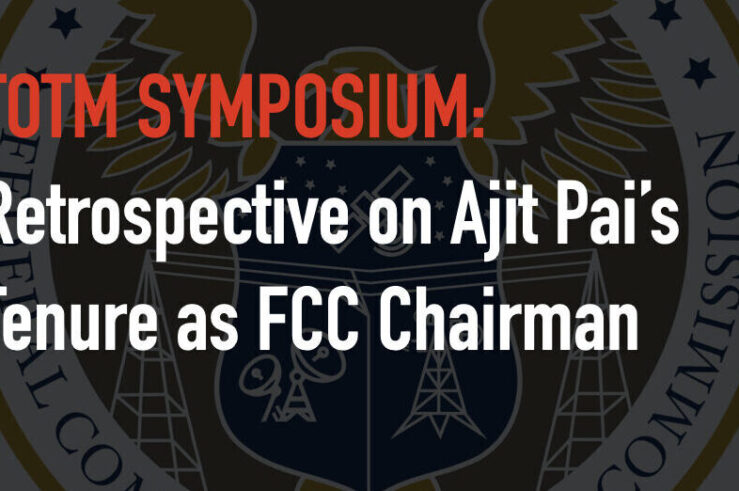Showing archive for: “FCC”
Why Restoring Internet Freedom Was a Landmark Accomplishment
I am pleased to participate in this retrospective symposium regarding Ajit Pai’s tenure as Federal Communications Commission chairman. I have been closely involved in communications law and policy for nearly 45 years, and, as I’ve said several times since Chairman Pai announced his departure, he will leave as one of the most consequential leaders in ... Why Restoring Internet Freedom Was a Landmark Accomplishment
Great Job, Kid! (And Welcome to the Private Sector)
Many thanks to Geoffrey Manne for this opportunity to memorialize a few thoughts I have about Ajit’s service on the Federal Communications Commission. My remarks will be more about Ajit as a person rather than the substance and long laundry list of his accomplishments as chair. Others will do that, I’m sure. The first memory ... Great Job, Kid! (And Welcome to the Private Sector)
Introductory Post: Retrospective on Ajit Pai’s Tenure as FCC Chairman
Ajit Pai will step down from his position as chairman of the Federal Communications Commission (FCC) effective Jan. 20. Beginning Jan. 15, Truth on the Market will host a symposium exploring Pai’s tenure, with contributions from a range of scholars and practitioners. As we ponder the changes to FCC policy that may arise with the ... Introductory Post: Retrospective on Ajit Pai’s Tenure as FCC Chairman
The Dishonesty of Conservative Attacks on Section 230
President Donald Trump has repeatedly called for repeal of Section 230. But while Trump and fellow conservatives decry Big Tech companies for their alleged anti-conservative bias, including at yet more recent hearings, their issue is not actually with Section 230. It’s with the First Amendment. Conservatives can’t actually do anything directly about how social media ... The Dishonesty of Conservative Attacks on Section 230
Islands of Chaos: The Economic Calculation Problem Inherent in Municipal Broadband
Municipal broadband has been heavily promoted by its advocates as a potential source of competition against Internet service providers (“ISPs”) with market power. Jonathan Sallet argued in Broadband for America’s Future: A Vision for the 2020s, for instance, that municipal broadband has a huge role to play in boosting broadband competition, with attendant lower prices, ... Islands of Chaos: The Economic Calculation Problem Inherent in Municipal Broadband
The Not Neutrality of Tech Reporting: Discussing the Economics of Lifting Data Caps During a Stay-at-home Crisis
[TOTM: The following is part of a blog series by TOTM guests and authors on the law, economics, and policy of the ongoing COVID-19 pandemic. The entire series of posts is available here. This post is authored by Justin “Gus” Hurwitz, (Associate Professor of Law & Co-director, Space, Cyber, and Telecom Law Program, University of ... The Not Neutrality of Tech Reporting: Discussing the Economics of Lifting Data Caps During a Stay-at-home Crisis
Thank you, Stigler Center, for the Compliment. Now Here’s Why You’re Wrong.
This guest post is by Neil Chilson, Senior Research Fellow for Technology and Innovation at Charles Koch Institute and former Chief Technologist at the Federal Trade Commission. Is it rude to respond to a compliment with a rebuttal? I’m afraid that’s what I’m about to do. The antitrust reformers at the University of Chicago’s Stigler ... Thank you, Stigler Center, for the Compliment. Now Here’s Why You’re Wrong.
The Ghosts of Antitrust Past: Part 3 (AT&T)
The case against AT&T began in 1974. The government alleged that AT&T had monopolized the market for local and long-distance telephone service as well as telephone equipment. In 1982, the company entered into a consent decree to be broken up into eight pieces (the “Baby Bells” plus the parent company), which was completed in 1984. ... The Ghosts of Antitrust Past: Part 3 (AT&T)
Municipal Revenue Extraction Should Not Stand in the Way of Next Generation Broadband
Advanced broadband networks, including 5G, fiber, and high speed cable, are hot topics, but little attention is paid to the critical investments in infrastructure necessary to make these networks a reality. Each type of network has its own unique set of challenges to solve, both technically and legally. Advanced broadband delivered over cable systems, for ... Municipal Revenue Extraction Should Not Stand in the Way of Next Generation Broadband
The Unconstitutionality of the FCC’s Leased Access Rules
Monday July 22, ICLE filed a regulatory comment arguing the leased access requirements enforced by the FCC are unconstitutional compelled speech that violate the First Amendment. When the DC Circuit Court of Appeals last reviewed the constitutionality of leased access rules in Time Warner v. FCC, cable had so-called “bottleneck power” over the marketplace for ... The Unconstitutionality of the FCC’s Leased Access Rules
This Too Shall Pass: Unassailable Monopolies That Were, in Hindsight, Eminently Assailable
[N]ew combinations are, as a rule, embodied, as it were, in new firms which generally do not arise out of the old ones but start producing beside them; … in general it is not the owner of stagecoaches who builds railways. – Joseph Schumpeter, January 1934 Elizabeth Warren wants to break up the tech giants ... This Too Shall Pass: Unassailable Monopolies That Were, in Hindsight, Eminently Assailable
The Mozilla oral arguments and the ongoing hell of the “net neutrality” debate
In the opening seconds of what was surely one of the worst oral arguments in a high-profile case that I have ever heard, Pantelis Michalopoulos, arguing for petitioners against the FCC’s 2018 Restoring Internet Freedom Order (RIFO) expertly captured both why the side he was representing should lose and the overall absurdity of the entire ... The Mozilla oral arguments and the ongoing hell of the “net neutrality” debate






